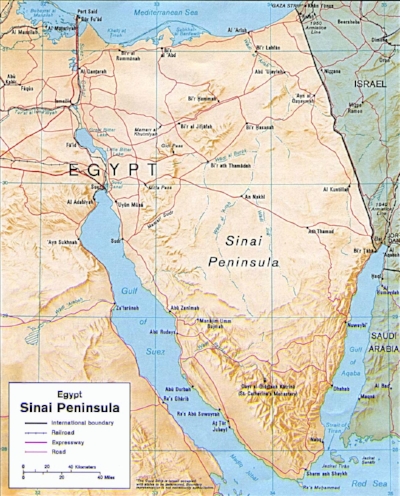It's a sad reality that much of the Middle East has become accustomed to appalling terrorist attacks. But a tragic attack earlier this week in Egypt that has left over 300 dead is something else entirely. Just before Friday prayers in the small village of Rawda, dozens of ISIS militants stormed the town mosque and began shooting and stabbing everyone in sight. Rawda is located in the Sinai Peninsula of Egypt, which has recently become a new haven for ISIS militants. This week, we'll try to understand why this attack happened and what it can tell us about the post-Caliphate evolution of ISIS.
The so-called Caliphate has lost nearly all of its major territory in Iraq and Syria in the past couple years. It now holds only a few small villages in scattered areas of the Levant. As nearly everyone expected, the group has shifted its efforts to insurgency movements in other unstable regions of the world. Now, ISIS has at least some small presence throughout parts of sub-Saharan Africa, central Asia, and northern Africa. Libya (which is essentially a failed state) and remote parts of Egypt have been especially prone to ISIS infiltration.
The Rawda Mosque
In the Sinai Peninsula, the ISIS ranks have been bolstered by fighters returning home after their defeats in Syria and Iraq. The group is also starting to ally itself more closely with tribal leaders and exploiting sectarian differences in the region, further increasing the ranks of those who are supporting the organization. But this isn't the first ISIS attack in the Sinai. Two years ago, a Russian passenger plane was blown up by a local ISIS affiliate in the Sinai region. The terrorist group has also persecuted local minority religions such as the Coptic Christians and Sufis. The reason for this latest attack is that Rawda is a predominantly Sufi village.
So what is Sufism? It's not quite Sunni Islam and not quite Shia Islam. It's a separate branch that focuses on mysticism (dealing mostly with unorthodox religious experiences or altered states of mind). The most well known example is the Whirling Dervishes, who dance in circles until they believe they have reached a higher spiritual experience (and not just dizziness). Of course, the people in the Rawda mosque weren't just spinning around in circles all the time. The Sufis have a rich and complex religious tradition that would take entire books to fully explain. The very fact of their differing beliefs is why ISIS is so determined to eradicate their sect. Their radicalism cannot tolerate any diverging Sunni opinions, let alone opinions from another tradition of Islam.
There's a lot more to Sufis than just twirling around.
The attack in Rawda was also a direct shot at the Egyptian military. Egypt's military has basically been running the country since the coup against Mohamed Morsi back in 2013. Egypt's president Abdel Fattah el-Sisi has been cracking down on terrorism (and free speech) in recent years, but is still unable to fully eliminate the pockets of ISIS fighters have that popped up. Their insurgent tactics are extremely effective in remote places like the Sinai. Since most of the country is desert, the military simply doesn't have the resources to provide security for the entire country. This development is also starting to worry Israel, which shares a long border with Sinai and the heavily locked-down Gaza area of Palestine.
What does the future have in store for Egypt and ISIS? Egypt will certainly crack down even harder on the terrorist group to attempt to prove it is still winning the fight. But it will take more than just guns and tanks to win over the local tribal groups who are sometimes siding with ISIS. Throughout the Middle East and North Africa, pockets of ISIS affiliated fighters will continue to pop up, creating a seemingly never ending game of whack-a-terrorist. Though the Caliphate is gone, the problems of instability and poor living conditions that created its rise continue to persist in much of the developing world.



